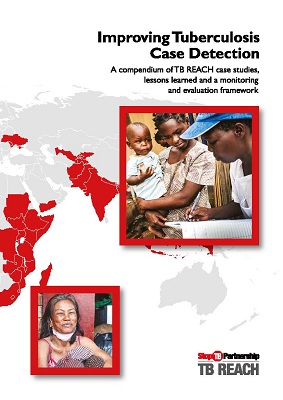Wave 6 Digital Adherence Technology Projects
TB REACH’s Wave 6 Call for Proposals had a special area of focus on using digital adherence technologies (DAT) to support patients with TB treatment and to improve treatment outcomes.
For more information, see Wave 6 DAT Background Concept Note
Wave 6 Selected DAT Projects
TB REACH funded 13 DAT projects for Wave 6. These projects are in 12 different countries, targeting different populations/settings, and using varying tools to promote and assess adherence to TB treatment. The DAT tools include 99DOTS, evriMED, SureAdhere (video observed technology (VOT), and other technologies.
Click here for a summary of the selected Wave 6 DAT projects.
Implementation Research
The 13 different TB REACH DAT projects provide a unique opportunity to understand the use and implementation of DATs for TB treatment across different settings and contexts. Lessons learned from these projects can add to the global evidence gap for understanding barriers and facilitators to the implementation and utilization of these tools by persons with TB, providers, and programs.
TB REACH has established a workgroup to develop standardized tools to assess the following implementation research (IR) framework components1-3:
- Feasibility: the extent to which the DAT can be practically used in a setting (e.g., infrastructure, and access to technology and networks)
- Acceptability: perceptions about using DATS among both patients and health care providers (e.g., perceived ease of use, usefulness, satisfaction, and cultural and social acceptability)4,5
- Cost: costs associated with implementing DAT projects (e.g., supplies, resources, and health care provider time, and patient costs)
- Accuracy: the extent to which the DAT accurately determines whether patients did in fact take their treatment doses.
The TB REACH DAT workgroup consists of the following persons and organizations:
- Amera Khan, TB REACH, Stop TB Partnership
- Danielle Cazabon, McGill International TB Centre
- Tripti Pande, McGill International TB Centre
- Amrita Daftary, McGill International TB Centre
- Charity Omenka, McGill International TB Centre
- Kristian Van Kalmthout, KNCV
- Adithya Cattamanchi, UCSF
- Bruce Thomas, Arcady Group
- Miranda Brouwer, PHTBConsult
- Oriol Ramis, Epirus
IR Tools
Feasibility and Acceptability Tools
The TB REACH DAT workgroup has developed the following questionnaires to assess feasibility and acceptability of DATs for both patients and health care providers. These questionnaires can be adapted and used by the TB REACH projects and other projects using digital adherence technologies.
- Health Care Provider Questionnaire
- Patient Questionnaire
For more information on using the tools, please contact TBREACH@stoptb.org
Cost
The McGill International TB Centre (Olivia Oxlade, Ntwali Placido Nsonglyumva, Tripti Pande, Danielle Cazabon, and Kevin Schwartzman) has developed tools to assess the cost associated with implementing DAT projects. These tools are currently being piloted and will be updated as needed. Below is a draft version for information only.
For more information on how to use the tool and access the updated guide and fillable templates, please contact: tbreach@paitbgroup.org
Accuracy
KNCV has also developed a sample protocol to assess the IR component of accuracy through urine analysis. For more information on the accuracy protocol and tool, please contact: digitalhealth@kncvtbc.org
References
1. Peters, David H., Taghreed Adam, Olakunle Alonge, Irene Akua Agyepong, and Nhan Tran. "Implementation research: what it is and how to do it." Bmj 347 (2013): f6753.
2. Proctor, Enola, Hiie Silmere, Ramesh Raghavan, Peter Hovmand, Greg Aarons, Alicia Bunger, Richard Griffey, and Melissa Hensley. "Outcomes for implementation research: conceptual distinctions, measurement challenges, and research agenda." Administration and Policy in Mental Health and Mental Health Services Research 38, no. 2 (2011): 65-76.
3. Subbaraman, Ramnath, et al. "Digital adherence technologies for the treatment of tuberculosis: landscape and research priorities." (2018).
4. Abu-Dalbouh, Hussain Mohammad. "A questionnaire approach based on the technology acceptance model for mobile tracking on patient progress applications." Journal of Computer Science 9, no. 6 (2013): 763-770.
5. Oshlyansky, Lidia, Paul Cairns, and Harold Thimbleby. "Validating the Unified Theory of Acceptance and Use of Technology (UTAUT) tool cross-culturally." In Proceedings of the 21st British HCI Group Annual Conference on People and Computers: HCI... but not as we know it-Volume 2, pp. 83-86. BCS Learning & Development Ltd., 2007.
In This Section
TB REACH 2013 Video
TB REACH Fact Sheet [.pdf]
TB REACH Wave 1 Report
Examples of how TB REACH grantees are reaching vulnerable population groups
Wave 1 Results Video
View in: Flash or Windows media
TB REACH 2012 Video
View in: Flash or Windows media
